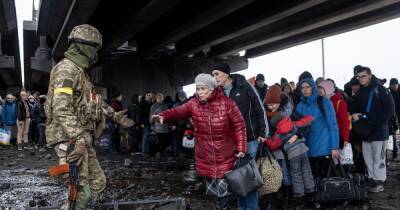Russia exploits football as soft-power tool but it also helped forge Ukraine’s identity
Josef Kordik was sitting in a cafe in Kyiv when a bedraggled man on the street caught his eye. That, he was sure, was Myklova Trusevych, the great Dynamo goalkeeper. He rushed outside. It was spring 1942, a few months after the city had fallen to the Nazis.
Kordik was a Moravian who had been left behind after fighting for Austria-Hungary in the first world war. He had not enjoyed his new life and watching football had been his only joy, but the occupation had meant opportunity. He had falsely claimed Volksdeutsch status and been installed as manager of Bakery Number 1.
But for most people occupation had brought suffering. Trusevych had sent his wife, who was Jewish, to Odesa to escape the fighting. His home had been destroyed and he was sleeping rough. Kordik offered him work and accommodation at the bakery. Other stricken Dynamo players joined him. When regular football was established as a way of normalising the occupation, the bakery set up a team and proved themselves the best side in the city.
They played the Luftwaffe team and beat them 5-1. Three days later, on 9 August, they played them again, winning 5-3 in what became known as the Death Match. No game has ever been so shrouded in myth. In the years immediately after the war, it was in effect hushed up.
Should Kyivans really have been playing football with the occupiers? After all, one player was sentenced to five years in the gulag for collaboration while another had emigrated to Canada; by definition, they were not good Soviets. But by the Brezhnev era their victory was celebrated: brave Communists offering hope to the people of Kyiv by beating the Nazis.
Details accrued, from the plausible – an SS officer had warned them not to win – to the absurd – the




